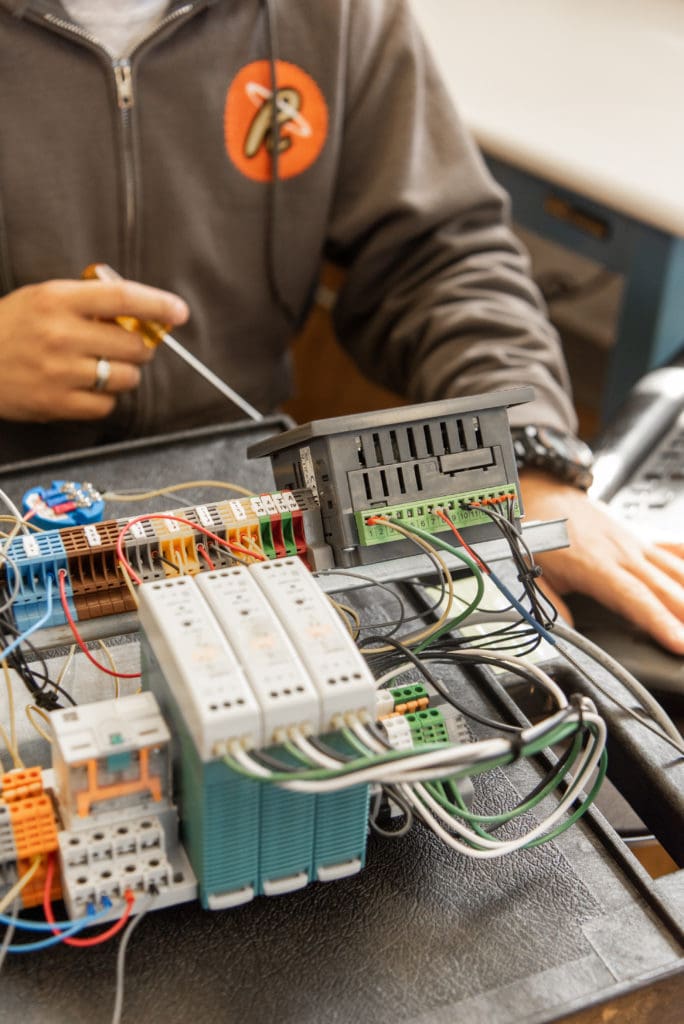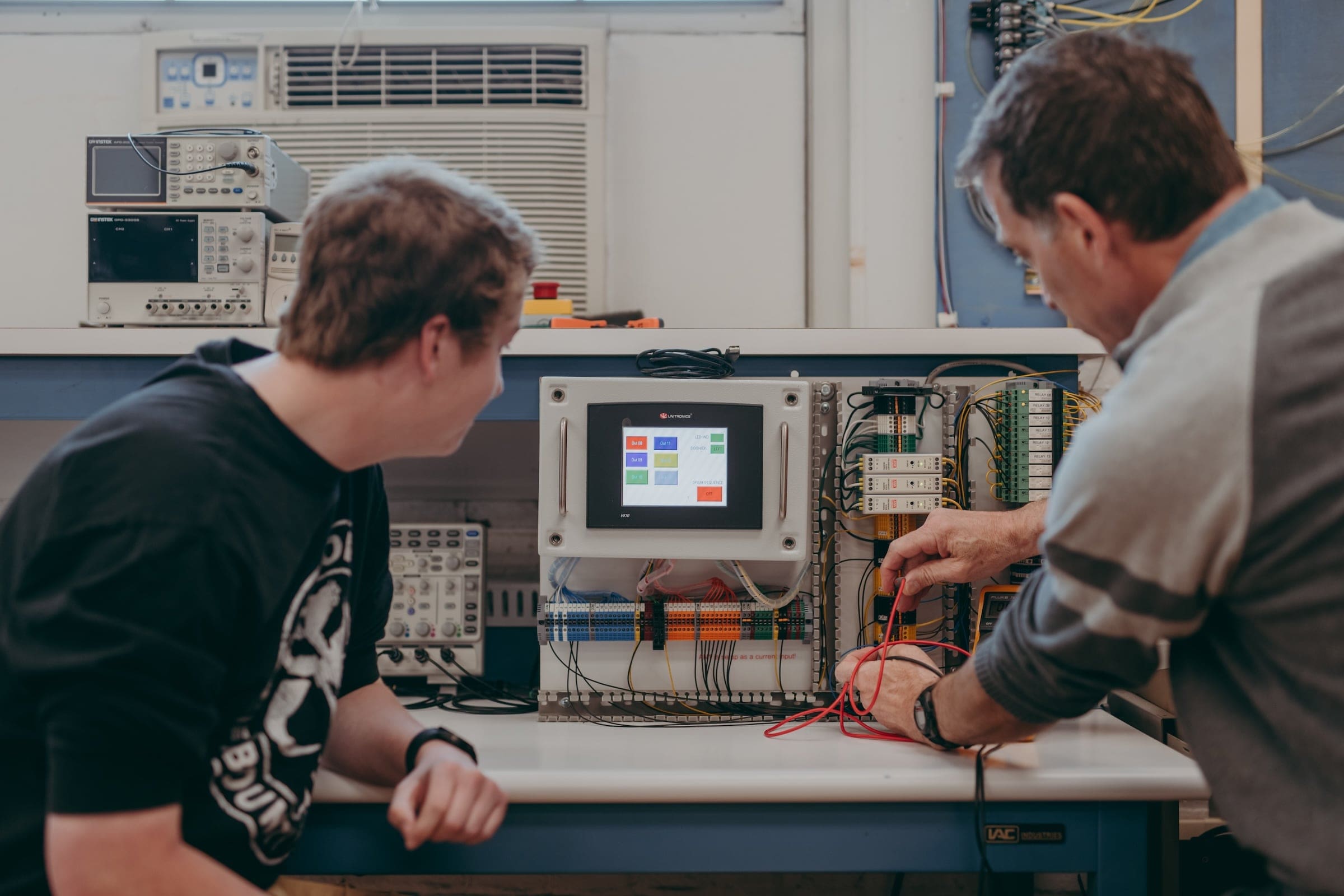
Electronic Engineering Technology
Get started today
About Electronic Engineering Technology
Electronic Engineering Technology provides the opportunity to acquire the skills needed to gain employment as an engineering technician in manufacturing and industry. Skills are developed by theoretical analysis and by the use of manipulative practice in the laboratory. The program gives students a broad theoretical and practical background in analog and digital electronic circuits. Graduates of the Electronic Engineering Technology program are prepared to find employment as technicians with the ability to prototype, to test, to program, to integrate, to install, to maintain, and to repair electronic systems. Because of the use of electronics in most industries, many employment opportunities in varied environments exist. High school prerequisites for this program are Algebra I and II, and a GPA of at least 2.5.
What you’ll learn
- Demonstrate a working knowledge of DC and AC components and circuits.
- Demonstrate a basic knowledge of solid state devices and circuits.
- Analyze, design, construct and integrate components and circuits of various types.
- Demonstrate a basic knowledge of digital electronics, logic circuits, microprocessors, and programmable automation controllers (PACs).
- Solve math problems related to circuit analysis, digital electronics, and other systems.
- Operate standard test equipment to analyze electronic systems.
- Design and troubleshoot simple microprocessor-based systems and interface peripheral devices.
- Work with motion control systems at a basic level.
- Understand pneumatics at a basic level.
- Network PACs and other data acquisition and control systems.
- Interface sensors and control elements to PACs.
Sample Job Titles
Apply electrical and electronic theory and related knowledge, usually under the direction of engineering staff, to design, build, repair, adjust, and modify electrical components, circuitry, controls, and machinery for subsequent evaluation and use by engineering staff in making engineering design decisions.
Communications Technologist, Electrical Engineering Technician, Electrical Technician, Electronics Engineering Technician, Electronics Technician, Engineering Technician (Engineering Tech), Engineering Technologist, System Technologist, Technologist
Quick facts
Location
Kreider Building, Second Floor, Main Campus
Type of program
Associate Degree
Job/Salary Outlook
See industry data
Length of program
2 years, 73 credits
Cost of program
$4,500/semester tuition
$3,000 – $3,500/semester housing
$1,850 – $2,335/semester meal plan
Tool List (PDF)
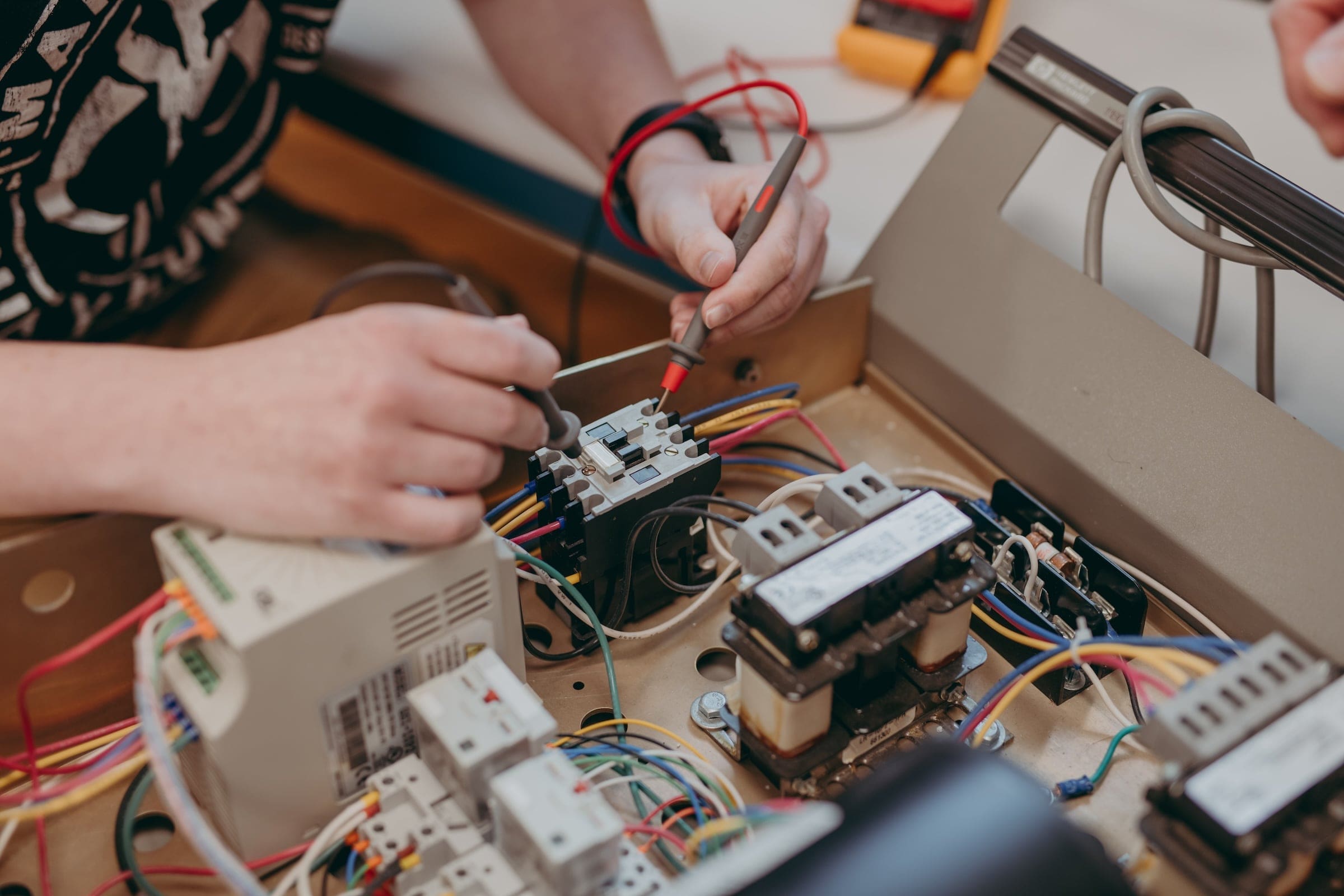
The outcomes speak for themselves
Graduates from this program can work with engineering staff to design, repair, and adjust electrical components and circuitry as a systems technologist or electronics engineering technician.
80%
employment
$62.5K
med. salary
6.7%
cont. education
People of TSCT
Success stories
Program details
Courses
MODEL SCHEDULE FOR ELECTRONIC ENGINEERING TECHNOLOGY
Semester 1
- EET 108 DC Fundamentals (w/lab) (4 credits)
- EET 118 AC Fundamentals (w/lab) (4 credits)
- EET 128 Combinational Digital Logic (w/lab) (4 credits)
- MATH 137 Intermediate Algebra (3 credits) – OR MATH 207 Pre-Calculus (4 credits)
- ENG 106 English Composition (3 credits)
Semester 2
- EET 158 Solid State Devices I (w/lab) (4 credits)
- EET 168 Solid State Devices II (w/lab) (4 credits)
- EET 178 Sequential Digital Logic (w/lab) (4 credits)
- MATH 141 Trigonometry (or higher) (3 credits) OR If Pre-Calculus taken previous semester, then ELECTIVE
- ENG 216 Technical Writing (3 credits)
Semester 3
- EET 217 Microprocessors/Microcontrollers (w/lab) (4 credits)
- EET 222 Interfacing & Programming Microprocessors (w/lab) (4 credits)
- EET 238 Interfacing and Basic Control Circuits (w/lab) (4 credits)
- PHYS 213 General Physics I (4 credits)
- Humanities Elective (3 credits)
Semester 4
- EET 258 Automation & Control Systems with PLCs I (w/lab) (4 credits)
- EET 268 Automation & Control Systems with PLCs II ( w/lab) (4 credits)
- EET 278 Data Acquisition and Control Project (4 credits)
Additional General Education Requirements
- ELECTIVE General Education Elective (3 credits)
- ELECTIVE General Education Elective (3 credits)
Total Credits 73
Faculty
Occupational Advisory Committee
The Occupational Advisory Committee (OAC) serves as a vital link between the Program of study and industry, ensuring that the program remains aligned with current workforce needs, technological advancements, and best practices in the field. Composed of employers, educators, and other community members, the committee provides guidance, feedback, and recommendations to enhance the curriculum, instructional methods, and student learning experiences.
Purpose and Responsibilities:
- Curriculum & Industry Alignment
- Workforce Readiness
- Student & Faculty Support
- Internship & Employment Connections
- Accreditation & Program Evaluation
- Facilities & Equipment Recommendations
By fostering a strong relationship between academia and industry, the OAC helps ensure that Thaddeus Stevens College programs maintain the highest standards in CTE (career and technical education).
- Kurt Suchar, Schaedler Yesco
- Gabriela Torres, TE Connectivity
Essential Skills Learned
Tasks
- Modify, maintain, or repair electronics equipment or systems to ensure proper functioning.
- Replace defective components or parts, using hand tools and precision instruments.
- Set up and operate specialized or standard test equipment to diagnose, test, or analyze the performance of electronic components, assemblies, or systems.
- Read blueprints, wiring diagrams, schematic drawings, or engineering instructions for assembling electronics units, applying knowledge of electronic theory and components.
- Identify and resolve equipment malfunctions, working with manufacturers or field representatives as necessary to procure replacement parts.
- Assemble electrical systems or prototypes, using hand tools or measuring instruments.
- Review electrical engineering plans to ensure adherence to design specifications and compliance with applicable electrical codes and standards.
- Assemble, test, or maintain circuitry or electronic components, according to engineering instructions, technical manuals, or knowledge of electronics, using hand or power tools.
- Review existing electrical engineering criteria to identify necessary revisions, deletions, or amendments to outdated material.
- Maintain system logs or manuals to document testing or operation of equipment.
- Select electronics equipment, components, or systems to meet functional specifications.
Tools used in this occupation
- Electronic measuring probes — Current probes; Probe stations; Voltage probes
- Frequency analyzers — Harmonic analyzers; Radiofrequency RF spectrum analyzers; Spectrum analyzers
- Multimeters — Analog multimeters; Digital multimeters; Signal measuring equipment
- Signal generators — Function generators; Radiofrequency RF signal generators
- Voltage or current meters — Analog current meters; Digital voltmeters DVM; Standing wave ratio SWR meters; Voltage testers
Technology used in this occupation
- Test equipment and information gathering from electronic sensors
- Specialized Computer-aided design software — Schematic capture and drawing tools for documentation
- Development environment software — Programming integrated development (IDE) for microprocessors and microcontrollers at assembly language level
- Industrial control software — Human-machine interface HMI software; programmable automation controller (PAC) software; Supervisory control and data acquisition SCADA software
- Word Processor — Spreadsheet applications and Parametric Searching tools
Knowledge
- Computers and Electronics — Knowledge of circuit boards, processors, chips, electronic equipment, and computer hardware and software, including applications and programming.
- Engineering and Technology — Knowledge of the practical application of engineering science and technology. This includes applying principles, techniques, procedures, and equipment to the design and production of various goods and services.
- English Language — Knowledge of the structure and content of the English language including the meaning and spelling of words, rules of composition, and grammar.
- Design — Knowledge of design techniques, tools, and principles involved in the production of precision technical plans, electronic schematics, drawings, and models.
- Mathematics — Knowledge of arithmetic, algebra, geometry, trigonometry, statistics, and their applications.
- Customer and Personal Service — Knowledge of principles and processes for providing customer and personal services. This includes customer needs assessment, meeting quality standards for services, and evaluation of customer satisfaction.
Skills
- Critical Thinking — Using logic and reasoning to identify the strengths and weaknesses of alternative solutions, conclusions, or approaches to problems.
- Reading Comprehension — Understanding written sentences and paragraphs in work-related documents.
- Complex Problem Solving — Identifying complex problems and reviewing related information to develop and evaluate options and implement solutions.
- Active Listening — Giving full attention to what other people are saying, taking time to understand the points being made, asking questions as appropriate, and not interrupting at inappropriate times.
- Troubleshooting — Determining causes of operating errors and deciding what to do about it.
- Speaking — Talking to others to convey information effectively.
- Mathematics — Using mathematics to solve problems.
- Monitoring — Monitoring/Assessing performance of yourself, other individuals, or organizations to make improvements or take corrective action.
Abilities
- Problem Sensitivity — The ability to tell when something is wrong or is likely to go wrong. It does not involve solving the problem, only recognizing there is a problem.
- Deductive Reasoning — The ability to apply general rules to specific problems to produce answers that make sense.
- Near Vision — The ability to see details at close range (within a few feet of the observer).
- Inductive Reasoning — The ability to combine pieces of information to form general rules or conclusions (includes finding a relationship among seemingly unrelated events).
- Written Comprehension — The ability to read and understand information and ideas presented in writing.
- Oral Comprehension — The ability to listen to and understand information and ideas presented through spoken words and sentences.
- Information Ordering — The ability to arrange things or actions in a certain order or pattern according to a specific rule or set of rules (e.g., patterns of numbers, letters, words, pictures, mathematical operations).
- Oral Expression — The ability to communicate information and ideas in speaking so others will understand.
- Finger Dexterity — The ability to make precisely coordinated movements of the fingers of one or both hands to grasp, manipulate, or assemble very small objects.
Work Activities
- Interacting With Computers — Using computers and computer systems (including hardware and software) to program, write software, set up functions, enter data, or process information.
- Making Decisions and Solving Problems — Analyzing information and evaluating results to choose the best solution and solve problems.
- Getting Information — Observing, receiving, and otherwise obtaining information from all relevant sources.
- Communicating with Supervisors, Peers, or Subordinates — Providing information to supervisors, co-workers, and subordinates by telephone, in written form, e-mail, or in person.
- Evaluating Information to Determine Compliance with Standards — Using relevant information and individual judgment to determine whether events or processes comply with laws, regulations, or standards.
- Documenting/Recording Information — Entering, transcribing, recording, storing, or maintaining information in written or electronic/magnetic form.
- Updating and Using Relevant Knowledge — Keeping up-to-date technically and applying new knowledge to your job.
- Inspecting Equipment, Structures, or Material — Inspecting equipment, structures, or materials to identify the cause of errors or other problems or defects.
- Identifying Objects, Actions, and Events — Identifying information by categorizing, estimating, recognizing differences or similarities, and detecting changes in circumstances or events.
- Processing Information — Compiling, coding, categorizing, calculating, tabulating, auditing, or verifying information or data.
- Repairing and Maintaining Electronic Equipment — Servicing, repairing, calibrating, regulating, fine-tuning, or testing machines, devices, and equipment that operate primarily on the basis of electrical or electronic (not mechanical) principles.
Work Context
- Electronic Mail — Daily email use
- Face-to-Face Discussions — Daily face-to-face discussions
- Indoors, Environmentally Controlled, Indoor Industrial, Outdoor in various environments, may include climbing — How often does this job require working in these different conditions?
- Freedom to Make Decisions — Daily decision-making without supervision.
- Must be Exact, accurate, and self-aware in every facet of the job.
- Jobs can be structured at times with most activities being unstructured and determined by the technician resolving the problem
- Telephone and other communication methods used on a daily basis.
- Working on an individual basis or within a work group to team are both job requirements
- Contact with others required on a daily basis.
Interests
- Realistic — Being an electronic technician is realistic involving the use to test equipment to resolve and repair problems. Work environment is mostly inside but may involve outside work environments also
- Investigative — These occupations frequently involve working with ideas and require an extensive amount of thinking. This can involve searching for facts and figuring out problems mentally.
- Conventional — Working as an electronic technician seldom involves set procedures and routines. Each situation requires different paths toward solutions
Work Styles
- Attention to Detail — Job requires being careful about detail and thorough in completing work tasks.
- Dependability — Job requires being reliable, responsible, and dependable, and fulfilling obligations.
- Analytical Thinking — Job requires analyzing information and using logic to address work-related issues and problems.
- Integrity — Job requires being honest and ethical.
- Adaptability/Flexibility — Job requires being open to change (positive or negative) and to considerable variety in the workplace.
- Cooperation — Job requires being pleasant with others on the job and displaying a good-natured, cooperative attitude.
- Initiative — Job requires a willingness to take on responsibilities and challenges.
- Independence — Job requires developing one’s own ways of doing things, guiding oneself with little or no supervision, and depending on oneself to get things done.
Work Values
- Support — Occupations that satisfy this work value offer supportive management that stands behind employees. Corresponding needs are Company Policies, Supervision: Human Relations and Supervision: Technical.
- Working Conditions — Occupations that satisfy this work value offer job security and good working conditions. Corresponding needs are Activity, Compensation, Independence, Security, Variety, and Working Conditions.
- Independence — Occupations that satisfy this work value allow employees to work on their own and make decisions. Corresponding needs are Creativity, Responsibility, and Autonomy.
Performance Measures
Internal Key Performance Indicators (Sources: Internal data collections, and Post-Graduate Surveys)
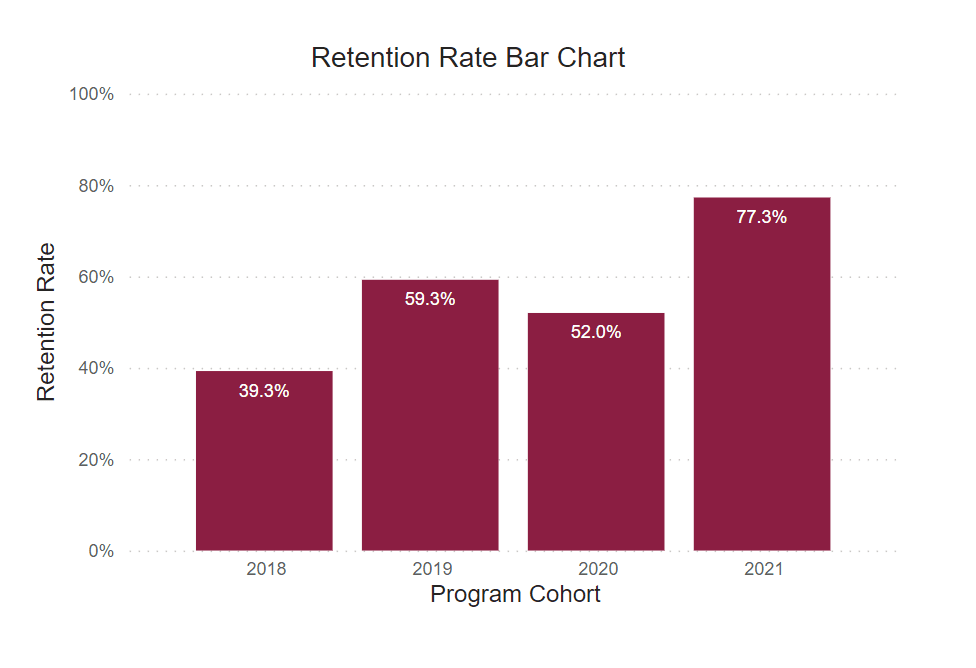
Retention Rate
This rate reflects the continuous term-to-term persistence rate for certificate programs and the fall-to-fall retention rate for associate degree programs.

Graduation Rate
This rate reflects the number of freshmen who were officially enrolled in the fall semester and earned a certificate or degree within the expected timeframe.
Post Graduate Survey Response Rate
The post graduate survey is an annual on-line post graduate survey utilized by the college to gather vital information regarding career placement, starting salary, and level of satisfaction.
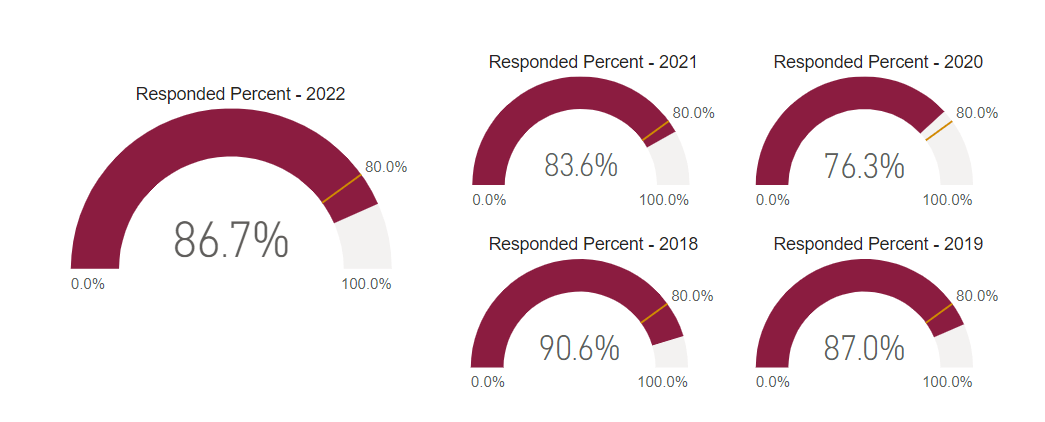
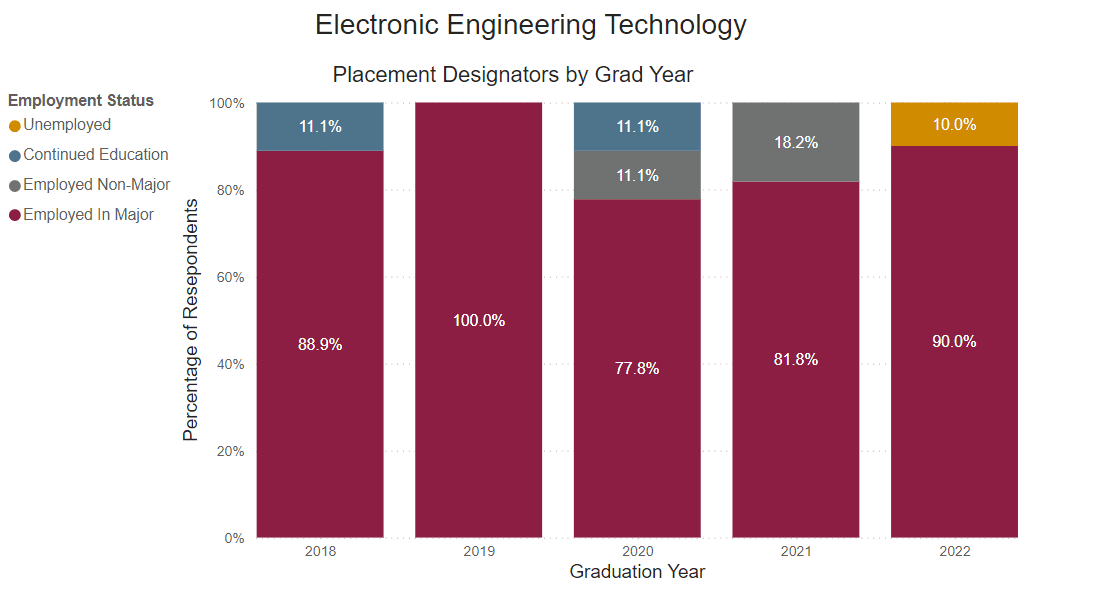
Employed Full Time Outside of Major
Percentage of graduates who reported being employed full-time outside their field of study.
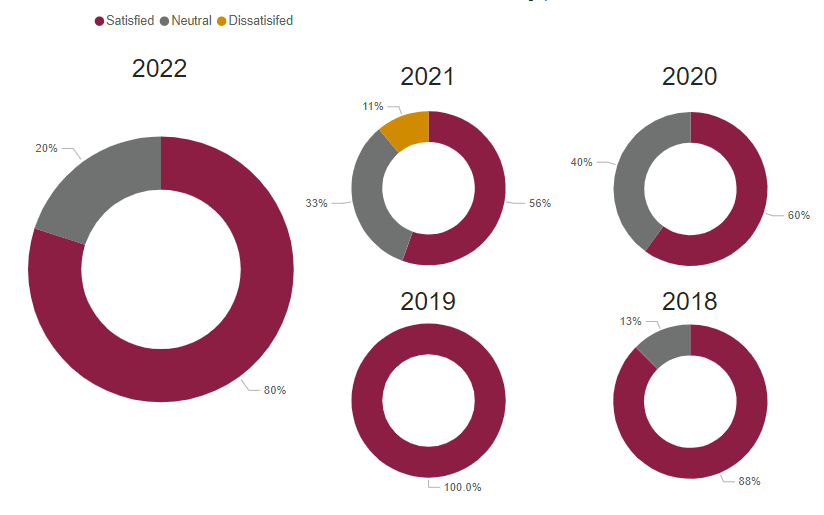
Graduate Satisfaction
This is the median graduate survey response evaluating the level of preparation for workforce entry (based on a 5-Item Likert Scale).

Placement Rate
This is the percent of graduate survey respondents who reported being employed or continued their education on a full-time basis.

Employed Full Time Within Major
Percentage of graduates who reported being employed full-time within their field of study.

Annual Median Starting Salary
This number is based on the graduate survey response to the request to identify a starting salary from a range of options. This graph shows the median first-year annual salary. All calculations are based on the respondent’s self-reported first-year annual income.
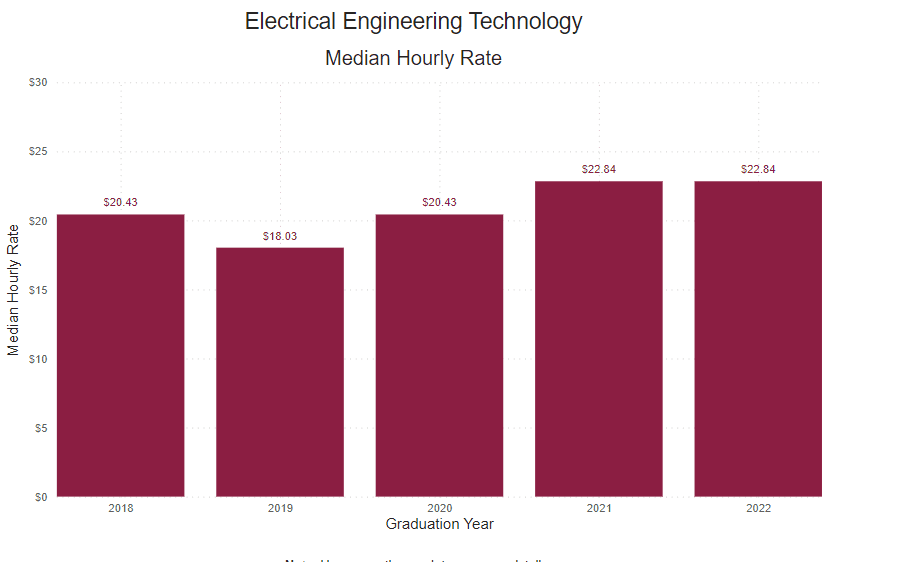
Reported Hourly Rate
This number is determined by dividing the reported median salary by the number of hours in a traditional full-time work week (40), then the number of weeks in a year (52).

Our graduates work with the industry’s best
